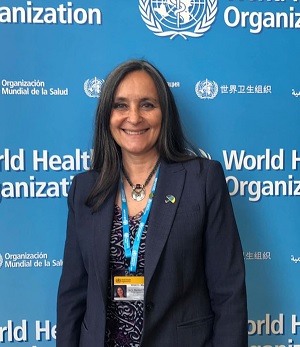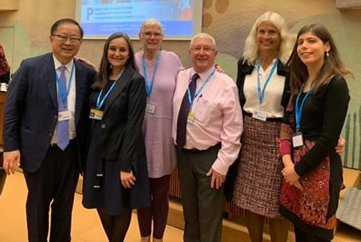WHO Emphasis on PHC gains international support
 Viviana Martinez-Bianchi, MD, WONCA WHO liaison person, recently attended the World Health Assembly (WHA) as part of the WONCA delegation and submits this report from WHA72.
Viviana Martinez-Bianchi, MD, WONCA WHO liaison person, recently attended the World Health Assembly (WHA) as part of the WONCA delegation and submits this report from WHA72.
On May 19-26, WONCA members were busy in Geneva, attending the World Health Assembly (WHA72). The Palais of the United Nations, was busy with people from over the world speaking the language of health, and health care. The typical topics of NCDs and communicable diseases, infant, maternal and child health, mental health, access to vaccines, emergency preparedness, patient safety, palliative care, were once again being discussed in its many rooms, and resolutions voted on by the member states of the World Health Organization (WHO).
Yet there was something different this year: The true awareness that vertical systems and vertical programs will not achieve their goals without strong primary health care.
This is my third year in Geneva as WONCA’s WHO Liaison, and I perceived a difference this time. A real and new awareness that what the world needs to improve health outcomes is for the majority of care to be delivered by Primary Health Care (PHC), through the work of interdisciplinary teams, and that these teams need to be well trained, well organized, well supported and well-funded to succeed.

WONCA participated actively and was well represented by: WONCA President, Donald Li; President-Elect, Anna Stavdal; Young Doctor representative, Ana Nunes Barata; WONCA CEO, Garth Manning; Bruce Chater as representative of the WONCA Working Party on Rural Practice; myself as WONCA WHO Liaison, and Monica Burns as WONCA WHO logistician. (
photo at right)
WONCA had meetings with Peter Salama, Executive Director UHC and Life Course; Ed Kelley, Shannon Barkley, Catherine Rouleau and Karen Kinder in Health Services Delivery at the World Health Organization; Jim Campbell, Director of the Health Workforce Department and team; Devora Kestel and Michelle Funk in the Department of Mental Heath and Substance Abuse; Jonathan Abrahams and Dirk Horemans in Disaster Risk Reduction, and Disaster preparedness. WONCA also had regional meetings with WPRO, PAHO, WHO AFRO and stayed in close contact with a number of other WHO officers.
We met with several non-State actors in collaboration with the World Health Organization. International Council of Nurses, leaders of the International Federation of Medical Students Associations, member representatives of the Global Coalition for Circulatory Health, Primary Health Care Performance Initiative, and World Federation of Public Health Associations, among many others.
On the first day, several WONCA members spoke at a side event hosted by China, with a keynote by Dr Tedros who highlighted, “
Let me put it simply: there is no UHC without PHC” “
In Astana last year we came together and declared that primary health care is the foundation of strong health systems, and that strong health systems are the foundation of universal health coverage”. “PHC drives forward equity, efficiency and effectiveness”. “
We need to be able to show our decision-makers what all of us serving in health care know – that providing high-quality, sustainable care in the community – in other words, care for all at all ages - is the most efficient use of health spending.”
Dr Tedros’ words resonated to my ears as the values of family medicine. During the same side event, WONCA President Donald Li, the only non-state actor participant among this high-level panel of ministers of health from many countries, stated “
Universal Health Coverage cannot be achieved without comprehensive, integrated, person-centred primary care services. And comprehensive primary care cannot be achieved without qualified primary care teams. We believe that qualified family doctors should lead those teams. Even as President of WONCA, representing 500,000+ family doctors globally, I would argue that effective, timely, primary care delivery is not only about doctors - but qualified family doctors should be the clinical lead of the professional, competent, multidisciplinary team, in order to reach greater numbers and population groups and deliver more effective care”. He highlighted that “
all members of the primary care team should be trained and qualified in delivering community based, person-centred primary care. WONCA is ready and willing to offer technical and policy support to any country which wants to incorporate qualified family doctors into the primary care team.”
Several ministers of health highlighted their efforts to strengthen PHC, with Søren Brøstrom Director General of the Danish Health authority receiving and applause when he made a special argument for investing in the specialty of Family Medicine for PHC towards Universal Healthcare (UHC).
Anna Nunes Barata spoke on the need to have family doctors involved in planning the future of healthcare delivery. I was asked to speak about the US healthcare system, and during my remarks, I highlighted that “
In the US, patient care delivered with a primary care orientation is associated with more effective, equitable, and efficient health services. Access to primary care lowers overall health care utilization, increases the use of preventive services, and lowers disease and death rates. The major specialty of primary care doctors in the US is family medicine, accounting for 40% of the total primary care physician workforce, followed by general internal medicine and general paediatrics. Family Medicine organizations in the US are building the primary health care workforce via the 25 x 30 initiative to ensure that by the year 2030, 25% of medical school seniors select family medicine as their specialty. Family Medicine strengthens US healthcare; my hope is that Family Medicine will strengthen health systems in every country in the world.”
WONCA offered comments on several discussions that took place at the World Health Assembly. A collaborative effort with our Special Interest Groups and Working Parties, provided expert opinion on PHC towards UHC, Emergency and Trauma Care, Global action on patient safety, Water sanitation and hygiene in health care facilities, among others.
I participated as an invited speaker representing WONCA on an International Vaccination and UHC Capacity Workshop hosted by the American Federation of Public Health Associations. I spoke on the role of Family Doctors in PHC, in connection to the theme of the event, strategies and good practices to increase primary prevention through increased capacity applied to the vaccination context.
Members States of the World Health Assembly supported the Astana Declaration and promised to support Primary health Care.
Lastly, I end with the words of Director General, Dr Tedros, said during an “Investing in Jobs Technical Briefing” at WHA72: “
The ultimate measure of whether our work this week is successful is not whether we approve resolutions and decisions. The ultimate measure is whether those resolutions are translated into laws, policies, plans and programmes that make a difference on the ground. To our colleagues in Ministries of Health, I ask how you will work with your colleagues across government to invest in jobs. Do you have a clear picture of the needs in your country? Do you have a plan for how to address those needs?To our friends from professional associations and youth organizations, thank you for the productive discussions we have had over the past few months. Our task now is to implement the outcomes of those discussions to strengthen continuing medical education and build multidisciplinary teams of health workers to deliver high-quality, people-centred care. I call on all of us join forces across professions to move together, instead of in parallel.
Invest in jobs for UHC. Ensure decent work and eliminate discrimination. Implement what works. Activate the power of youth. And harness technology to maximize impact.”